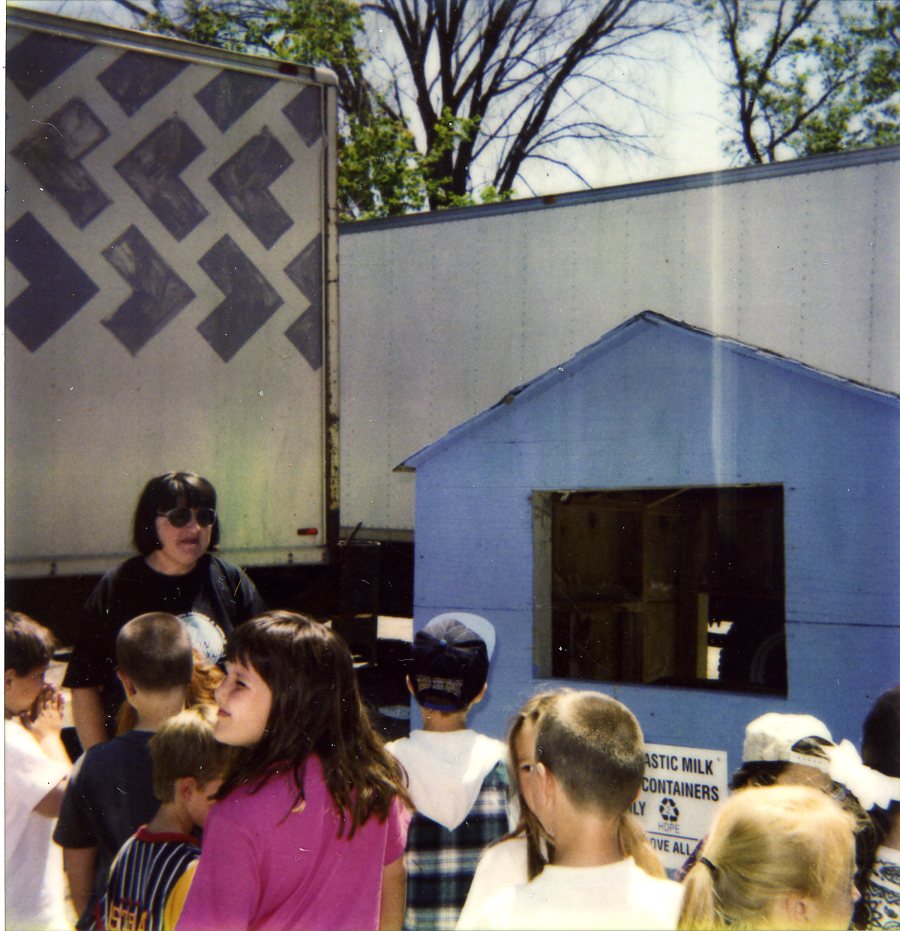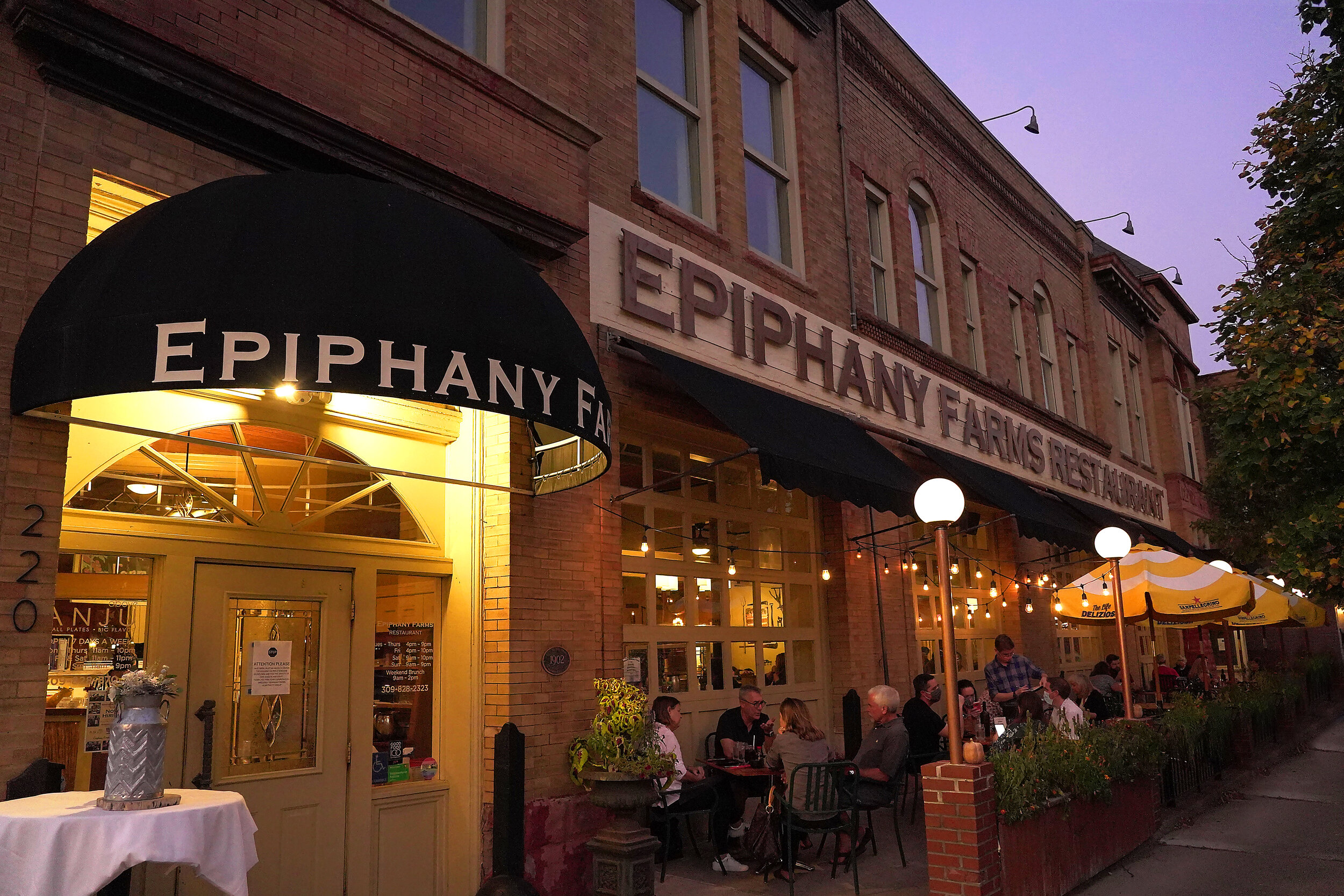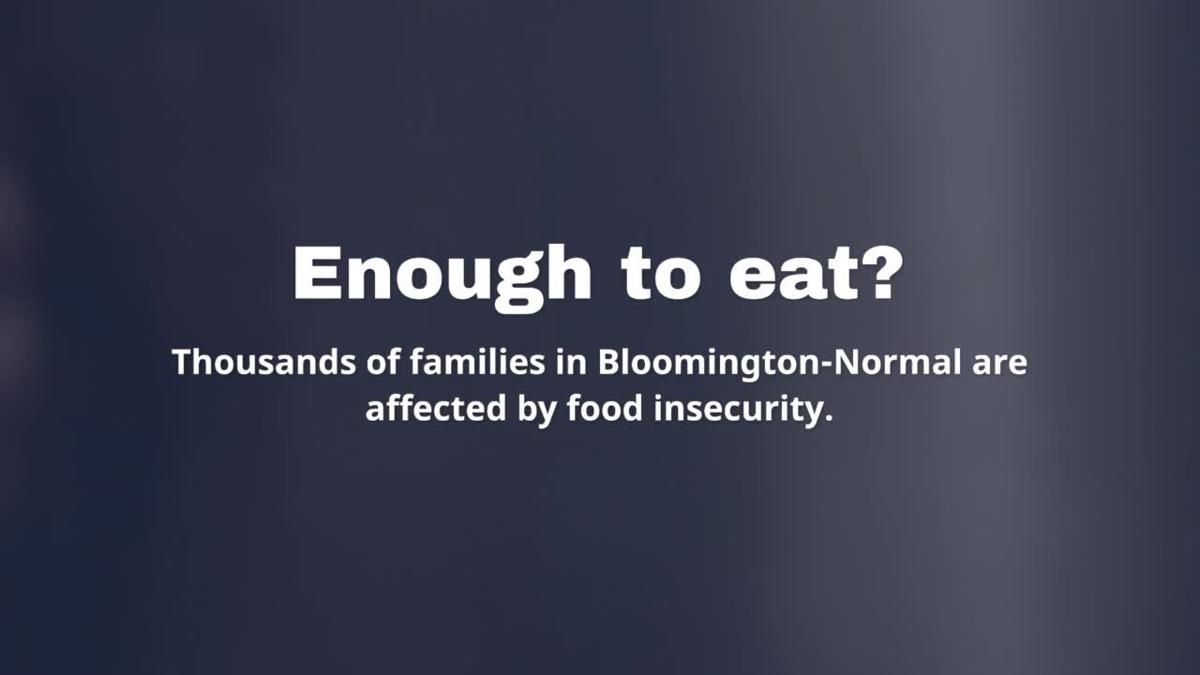 [1]Food Insecurity is the condition of not having access to sufficient food, or food of an adequate quality, to meet one's basic needs. Food Insecurity has been a huge problem in Illinois. This statistic is for Illinois as a whole. "In Illinois, 1,201,290 people are facing hunger - and of them 315,330 are children. 1 in 11 people face hunger. 1 in 9 children face hunger."[1]
[1]Food Insecurity is the condition of not having access to sufficient food, or food of an adequate quality, to meet one's basic needs. Food Insecurity has been a huge problem in Illinois. This statistic is for Illinois as a whole. "In Illinois, 1,201,290 people are facing hunger - and of them 315,330 are children. 1 in 11 people face hunger. 1 in 9 children face hunger."[1]
For strictly Bloomington Normal Mclean County, 16,340 people struggle with food insecurity.[2] Which may seem like only a little bit being its only 9.5% of the population at the time of 2019. But those 16,340 people were not able to have access to sufficient, healthy or had inadequate quality in their food. Along with Food Insecurity their are factors that go along with it "people facing hunger struggle with high living costs, expensive housing, unemployment, and low-wage jobs."[3]
[2]
To help counteract these problems SNAP was introduced. SNAP, short for Supplemental Nutrition Assistance Program. "SNAP, formerly food stamps, provides temporary help for people going through hard times – providing supplemental money to buy food until they can get back on their feet."[4] In Illinois, 38.3% of households receiving SNAP benefits have children. $2,646,035,880 distributed through SNAP generated $4,498,260,996 in economic activity.[1]
<div> <div> A 16 year old teenager from Bloomington was visiting Washington D.C. to strengthen lawmakers on nutrition benefits in the next farm bill. The 2023 Farm Bill presents an important opportunity to strengthen SNAP benefit adequacy and equitable access.[5] His name is Atyam and he has said that hunger as a whole is a unique issue because it’s a root problem. A quote from him stated “If that root problem exists, there’s always going to be problems on the exterior – such as education, health, mental health. That list is endless really,”[6] They talk about The Supple mental Nutrition Assistance Program (SNAP) and how it’s part of the five-year farm bill. This bill expires in 2023 and is being renegotiated. Food stamps are funded through the regular budget process, the farm bill helps make the rules for how the programs will work and who qualifies.</div>
<div> </div>
Definitions
Current Usage
Food insecurity is when people can't access the food they need to live their fullest lives. There are many causes of food insecurity. But one thing is clear: financial security for everyone is the most effective way to end hunger.[7]
SNAP or the Supplemental Nutrition Assistance Program, provides monthly funds to buy groceries. It is the largest anti-hunger program in America, helping over 41 million people in 2022.[8]
The 2023 Farm Bill presents an important opportunity to strengthen SNAP benefit adequacy and equitable access.[5]
Hunger Relief Organizations
Here are some Food Assistance Organizations that help with providing the community of Bloomington Illinois with food and solve other problems related to insecurities.
-
Community Development Block Grant COVID-19 (CDBG-CV)
-
St. Vincent De Paul Food Pantry - 309-829-9611
705 N. Roosevelt Avenue, Bloomington, IL
Mondays, 8:00 a.m. - 2:00 p.m.
Currently, distribution of food is in the parking lot, food is loaded into vehicles. Food is distributed to walkups, as well.
-
Free Summer Meals - District 87
District 87 sponsors the Summer Food Service Program and will provide free meals to ANYONE 18 years old and under. Parents and/or guardians may pick up meals for their children; children do not need to be present. Meals will distributed from school buses and District 87 vehicles.
-
Sunnyside Community Garden & Food Forest - 309-662-4477
West end of Illinois Street/Northwest corner of Sunnyside Park, Bloomington, IL
Sunnyside Community Garden & Food Forest has started planting its garden.
We are in need of:
Donations for the garden
Volunteers times: Monday/Friday/Saturday, 8:00 a.m. - 11:00 a.m. and starting in June, Wednesdays from 5:00 p.m. - 7:30 p.m. for the Free Market. Come at your own time. Social distancing protocols will be in place; it's a big place and easy to do.
First Free Market starts Wednesday, June 3 from 6:30 p.m. - 7:30 p.m. We will have vegetables and some fruits to give out, plus food from the Beacon of Hope.
-
Salvation Army – 309-829-9476
611 W Washington Street, Bloomington, IL
Food Pantry, Mondays and Wednesdays 9am–3pm (excluding holidays)Current McLean County residents
Please bring a Photo ID and current piece of mail
-
Home Sweet Home Ministries – 309-828-7356
301 E. Oakland Street, Bloomington, IL
Food Boxes, Monday/Wednesday/Friday, 3:00 p.m. - 5:00 p.m.
303 E. Oakland Street, Bloomington, IL
Sack Lunch/Dinner, 7 Days a Week, 10:30 a.m. - 1:00 p.m. and 4:30 p.m. - 6:00 p.m.
-
Women, Infant and Children (WIC) - 309-888-5457
200 W Front Street, Bloomington, IL
Usual services are still available, but people are asked to call ahead as some services can be completed by phone or through curbside pickup.
-
Apostolic Pentecostal Church Food Pantry - 309-829-3936
2810 Tractor Lane, Bloomington, IL 61704
Open from 10 a.m. to Noon every Saturday
-
Boys & Girls Club - 309-829-3034
1615 Illinois Street, Bloomington, IL
Meals, Monday - Friday, 3:00 p.m. -4:30 p.m. (while supplies last)
1615 Illinois Street
Miller Park
Orlando &Northbrook, Normal
Tony's Diner, Tracey Drive
Monthly Food Box, 3rd Friday of the Month, 3:00 p.m. - 4:30 p.m. (while supplies last)
1615 Illinois Street
-
Western Avenue Community Center - 309-829-4807
600 N. Western Avenue, Bloomington, IL
Meals, Monday - Friday, 3:00 p.m. - 5:00 p.m.
-
Mt. Pisgah Baptist Church - 309-828-2571
801 W. Market Street, Bloomington, IL
Food Pantry, Wednesdays, 5:00 p.m. - 7:00 p.m.
-
Ministry & More - 309-823-9804
1107 W. Empire Street, Bloomington, IL
Wednesday/Thursday, 10:00 a.m. - 12:00 p.m. Please call ahead and leave a message to make an appointment; Curbside Pickup.
Definitions
Sustainability:
Sustainability refers to the ability to meet present needs without compromising the ability of future generations to meet their own needs.[6] It involves balancing social, environmental, and economic factors to ensure that resources are used in a way that maintains their availability for the long term. Sustainability encompasses practices that minimize negative impacts on the environment, promote social equity, and foster economic prosperity. This involves considering the lifecycle of products and processes, striving for efficiency, reducing waste, conserving resources, and promoting renewable energy sources. Sustainability is an approach that seeks to create a harmonious balance between human activities and the natural world, aiming for resilience and longevity in the face of global challenges like climate change, biodiversity loss, and social inequality.
Sustainable Agriculture:
Farming in sustainable ways meeting society's present food and textile needs, without compromising the ability for current or future generations to meet their needs. It can be based on an understanding of ecosystem services. This means using reusable products, not using harmful chemicals, composting.[8]
Carbon Neutrality:
Compost:
Compost is a mixture of materials that can be used as plant fertilizer and to improve soil's chemical, physical, and biological properties. It is most frequently made by decomposing plant and food waste, recycling organic materials, and manure.
Recycle:

Recycling is the process of converting waste materials into new materials and objects. This concept often includes the recovery of energy from waste materials. The recyclability of a material depends on its ability to reacquire the properties it had in its original state.
Climate Change:
Climate change describes global warming—the ongoing increase in global average temperature—and its effects on Earth's climate system.
Climate change in a broader sense also includes previous long-term changes to Earth's climate.
Biodegradation:
The breakdown of organic matter by microorganisms, like bacteria and fungi. It is generally assumed to be a natural process, which differentiates it from composting. See above.
Climate Change:
Climate change describes global warming—the ongoing increase in global average temperature—and its effects on Earth's climate system. Climate change in a broader sense also includes previous long-term changes to Earth's climate.
Greenhouse Gas:
Greenhouse gases are the gases in the atmosphere that raise the surface temperature of planets. What distinguishes them from other gases is that they absorb the wavelengths of radiation that a planet emits, resulting in the greenhouse effect. Greenhouse gasses are known to negatively affect the environment by trapping heat, causing climate change, and contribute to respiratory diseases from air pollution and smog.
Carbon Footprint:
A calculated value or index that makes it possible to compare the total amount of greenhouse gases that an activity, product, company or country adds to the atmosphere. Carbon footprints are usually reported in tonnes of emissions per unit of comparison.
History
Ecology Action Center
One of the first "sustainability focused" operations in Bloomington Normal was called "Operation Recycle". A “one-time” recycling drive was held for one weekend in February 1971. The town of Bloomington-Normal had sites set up at five locations: Miller Park, Park United Methodist Church on Allen, Illinois State University (ISU), Illinois Wesleyan University (IWU), and Sears. WJBC radio host Don Munson heavily promoted the recycling drive on the show Problems and Solutions. 105 tons of paper and more than 20 tons of glass were collected that weekend, a number that the town has never seen before. Volunteers had to break up the 20-plus tons of glass in order for it to be transported.[5]
From 1971 - 1982, recycling drives were consistently held throughout Bloomington Normal every 4-7 weeks. The organizers of the drives still did not have a name at this point, so WJBC radio host Don Munson came up with “Operation Recycle.” The all-volunteer Operation Recycle relied on volunteers from area churches and scout groups to staff the recycling drives. A cadre of regular volunteer site-supervisors took charge of the threesites used regularly: Park United Methodist Church, the Sears parking lot at Eastland Mall, and an ISU parking lot at the corner of College and Main. Ham radio operators continued to provide communications for each drive.[5]
 Operation recycle’s first director, Myra Gordon, leads educational tours of the recycle yard.
Operation recycle’s first director, Myra Gordon, leads educational tours of the recycle yard.
<div>
In 1983, after Operation Recycle goes full-time, they set up drop boxes around town where residents could recycle anytime. A recycling buy-back operation was opened where people were paid for the materials they brought in to recycle. In the summer, the buy-back would even offer special promotions for kids at the buy-back, providing free Happy Meals and other incentives thanks to donations from local businesses. After a few years passed, corrugated cardboard, high-grade office paper and bimetal cans were added to the list of materials that could be recycled and the volume of recycled materials grew from 200—300 tons a year to 1,000 tons.[5]
Operation Recycle developed the first program in McLean County to pick up recyclables from businesses and campus office buildings and residence halls. By doing this garbage was reduced by 70-to-80 percent. Operation Recycle would call businesses and ask if they could take their cardboard and paper to recycle, they would go to 40+ businesses normally.[5]
In the early 90s other towns in addition to Bloomington and Normal began recycling and environmental education. Those towns were Chenoa, Lexington, Heyworth, LeRoy, Hudson, Lake Bloomington, Towanda, and Colfax The village of Danvers worked with Operation Recycle in 1990 to create the most successful rural drop-box program in the state.[5]
In 1994 Operation Recycle renovated the nineteenth century Hewett House before opening the Ecology Action Center there in February 1995. After renovations are complete, the Ecology Action Center opens as an educational center open to the public and for children to learn. Operations have continued strong to this day. [5]
Epiphany Farms
 Front of Epiphany Farms RestaurantEpiphany Farms Restaurant
Front of Epiphany Farms RestaurantEpiphany Farms Restaurant
Epiphany Farms Restaurant is a rustic-chic eatery offering seasonal farm-to-table cooking with international influences, located in downtown Bloomington, IL. The menu is ever-changing as it is based off of the seasonal farming, coming from the farm with the same name "Epiphany Farms Estate", so the options on the menu during the summer come from the recent summer harvests, which heavily differ from a winter harvest. The restaurant was opened in 2009 (formally Station 220 Restaurant, with different owners) by Ken Myszka, Nanam Myszka, and Stu Hummel (left company in 2023). The mission was and still is to create a diversified, pasture based, food system, one that blends beyond organic farming with impeccable food. [9] The resauraunt has stayed open for the last 14 years and has been going strong since opening in 2009, with all other operations growing in scale, like the other restaurants owned by Ken and Nanam (Anju, Harmony KBBQ, and Bakery & Pickle) as well as the scale of the farm. If you're looking for a more casual dining experience, Anju is other restaurant owner and operated by the same owners, with a focus on sharable Korean fusion dishes.
Epiphany Farms Estate

References
Podcast: https://rss.com/podcasts/sustainableworld
[1] Coussens, Staci. Walk on over to raise hunger awareness. Illinois Extension. (2023, September
7). https://extension.illinois.edu/news-releases/walk-over-raise-hunger-awareness
Accessed February 21
[2] Denham, R. Bloomington teen travels to DC to push for snap nutrition benefits in Next Farm
bill. WGLT. (2023, July 18). https://www.wglt.org/local-news/2023-07-18/bloomington-
teen-travels-to-dc-to-push-for-snap-nutrition-benefits-in-next-farm-bill Accessed
February 21
[3] Heartland’s food share program keeps students from going hungry. WJBC AM 1230. (2021,
September 27). https://www.wjbc.com/2018/02/03/heartlands-food-share-program-
keeps-students-from-going-hungry/ Accessed February 21
[4] Alkire, D. J. Need for help with food is growing in McLean County, advocates say.
pantagraph.com. (2023, September 24). https://pantagraph.com/news/local/need-for-
help-with-food-is-growing-in-mclean-county-advocates-say/article_c7435622-5983-
11ee-9cd2-8b0d00abdb19.html Accessed February 21
[5] Roberts, Carl. “History.” Ecology Action Center, Ecology Action Center, n.d, ecology
actioncenter.org/about/history/. Accessed March 2
[6] “Sustainability.” United Nations, Department of Global Communications, n.d.,
www.un.org/en/academic-impact/sustainability. Accessed February 21
[7] “What Is Carbon Neutrality and How Can It Be Achieved by 2050?: Topics: European Parliament.” Topics| European Parliament,
The Publications Office of the European Union, 10 Mar. 2019, www.europarl.europa.eu/topics/en/article/20190926STO62270/
what-is-carbon-neutrality-and-how-can-it-be-achieved-by-2050#:~:text=Carbon%20neutrality%20means%20having%20a,is
%20known%20as%20carbon%20sequestration. Accessed February 21
[8] “Sustainable Agriculture.” Sustainable Agriculture | National Agricultural Library, USDA ERS, www.nal.usda.gov/farms-and-agricultural-production-systems/sustainable-agriculture#:~:text=Sustainable%20agriculture%20is%20farming%20in,best%20use%20of%20nonrenewable%20resources. Accessed 8 May 2024.
[9] Ken Myszka.” Epiphany Farms Hospitality Group, Epiphany Farms Hospitality Group,
epiphanyfarms.com/kenmyszka#:~:text=The%20mission%20is%20to%20create,organic
%20farming%20with%20impeccable%20food. Accessed 10 Apr. 2024.
[10] Epiphany Farms Estate.” Epiphany Farms Hospitality Group, Epiphany Farms Hospitality Group,
https://epiphanyfarms.com/estate. Accessed 10 Apr. 2024.
</div>






